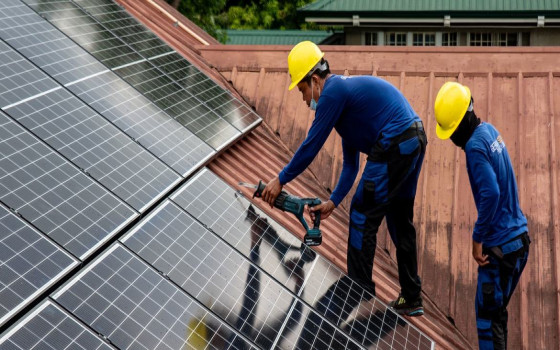
The United Nations warns: the world is deviating from the right track to provide sustainable energy by 2030

- Europe and Arabs
- Wednesday , 7 June 2023 14:8 PM GMT
New York: Europe and the Arabs
A new report issued by the United Nations and its partners reveals that the world is not on track to achieve the seventh goal of sustainable development, which is related to ensuring universal access to reliable, sustainable and affordable energy. According to the United Nations news bulletin, of which we received a copy this morning
The report, Tracking Sustainable Development Goal 7: The Energy Progress Report, warns that current efforts are not enough to achieve the target by 2030, despite some progress.
The report was produced by the International Energy Agency, the International Renewable Energy Agency, the United Nations Statistics Division, the World Bank, and the World Health Organization.
The report confirmed that some progress has been made on specific elements of the seventh goal, including for example increasing the rate of use of renewable energy sources in the energy sector, but that more needs to be done by the deadline.
Goal 7 of the Sustainable Development Goals is concerned with ensuring access to modern, reliable, sustainable and affordable energy. The report's authors said the goal includes universal access to clean electricity and cooking fuels, doubling historical levels of efficiency improvements, and significantly increasing the share of renewables in the global energy mix.
Benefits of achieving the seventh goal
Achieving Goal 7 will have a profound and positive impact on people's health and well-being, helping to protect them from environmental and social risks such as air pollution, and expanding access to primary health care and services.
The global energy crisis, exacerbated by the war in Ukraine, is expected to spur the deployment of renewable energy sources and improve energy efficiency, as some governments boost investment in this field.
However, estimates by the International Renewable Energy Agency show that international public financial flows to support clean energy in low- and middle-income countries declined even before the COVID-19 pandemic, and that financing is limited to a small number of countries.
The authors of the report stressed the need to undertake a structural reform of international public finance and identify new opportunities to unlock investments in order to achieve the seventh sustainable development goal.
The report also found that mounting debt and rising energy prices exacerbate problems of universal access to clean cooking and electricity.
shortcomings
Current projections estimate that 1.9 billion people will be without clean cooking facilities, and that 660 million people will not have access to electricity in 2030, if the status quo continues.
The report indicated that these gaps will negatively affect the health of the most vulnerable populations around the world, and will lead to an acceleration of climate change.
According to the World Health Organization, 3.2 million people die each year from diseases caused by the use of polluting fuels and technologies, which increase exposure to toxic levels of household air pollution.
Protect the next generation
Dr Tedros Adhanom Ghebreyesus, Director-General of the World Health Organization, said investing in clean and renewable solutions to support universal access is the way to make a real difference. He stressed that clean cooking techniques in homes and reliable electricity in healthcare facilities can play a critical role in protecting the health of the most vulnerable populations.
"We must protect the next generation by acting now," he said.
For his part, Stefan Schoenfest, Director of the United Nations Statistics Division, said that despite the recent slowdown, the number of people without access to electricity has almost halved over the past decade, from 1.1 billion in 2010 to 675 million in 2021.
However, he said, “However, additional efforts and measures must be taken urgently to ensure that the poorest and hard-to-reach people are not left behind. To achieve universal access by 2030, the development community must scale up clean energy investments and intensify its policy support.”
The report will be presented to senior decision-makers during the High-Level Political Forum on Sustainable Development on July 11, ahead of the second SDG Summit in September in New York.
The authors of the report urge the international community and policymakers to protect gains in achieving SDG 7, push forward with structural reforms, and maintain a strategic focus on the vulnerable countries that need the most support.












No Comments Found